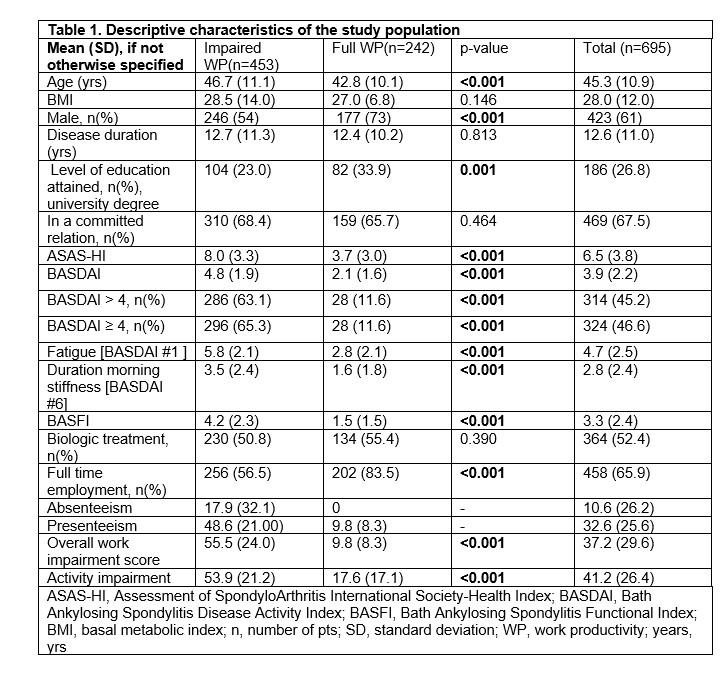Session Information
Session Type: Poster Session A
Session Time: 8:30AM-10:30AM
Background/Purpose: Axial spondyloarthritis (axSpA) is a chronic inflammatory condition often associated with impaired working participation1 not only translating to devastating outcomes for patients (pts) but also increased economic and social burden due to a significant amount of indirect costs. Data on the different work participation domains in axSpA pts with access to biologic therapies are limited. The objective of this survey is to characterise the different domains of work participation [presenteeism, absenteeism, sick leave, unemployment, disability pensions] in axSpA pts and their associations with demographic and clinical confounders.
Methods: Pts with confirmed clinical diagnosis of axSpA were enrolled in a multicenter, observational ATTENTUS survey conducted across Germany (Nov-2019 to Jul-2020). To ensure high data quality, inclusion criteria was verified by external monitoring, followed by evaluation of the domains of impaired work participation, including absenteeism and presenteeism (WPAI). Demographics, clinical parameters and patient related outcomes (PROs) were collected via tablet This analysis included all working patients ≥18 years.; and excluded students and retired pts. Pts without absenteeism (value=0) and presenteeism ≤20% were defined as no impairment at work.
Results: A total of 787 axSpA pts were enrolled in the survey. Seven students, 68 retired pts and 17 pts not fulfilling the inclusion criteria were excluded from this analysis, leaving 695 pts with complete data sets. Baseline data are outlined in Table. 50 pts received disability pensions, 29 pts received unemployment benefits, 590 (84.9%) pts reported paid work [part-time: n=132 (22.4%); full-time: n=458 (65.9%)], with 242 (41.0%) pts having no impairments at work. 379 (64.2%) employed pts took sick leave within the previous 12 months (mo) (< 3 mo: n=351; 3–6 mo: n=17; >6 mo: n=11). Absenteeism and presenteeism occurred in 140 (23.7%) and 496 (84.1%) pts, respectively. Pts without impairments were mostly of young age, male sex, well-educated, with low disease activity, less fatigue and shorter duration of morning stiffness, and preserved global and physical functioning. No apparent differences between pts with and without impairment of work participation were observed in terms of biologic treatment, disease duration and BMI.
Conclusion: There was a substantial impact on work participation for axSpA pts. Despite numerous available therapeutic options physical function was still impaired and lead to high rates of impairment of work participation. Pts with impaired work participation compared to pts with no impairment, reported increased fatigue, longer duration of morning stiffness, decreased functional capacity, female sex and a lower level of education.
References:
- Ramoda R et al. Arthritis Res Ther. 2016;78
To cite this abstract in AMA style:
Kiltz U, Hoeper K, Hammel L, Lieb S, Haehle A, Meyer-Olson D. Work Participation in Patients with Axial Spondyloarthritis in Germany: Results from a Multicenter, Observational Survey [abstract]. Arthritis Rheumatol. 2021; 73 (suppl 9). https://acrabstracts.org/abstract/work-participation-in-patients-with-axial-spondyloarthritis-in-germany-results-from-a-multicenter-observational-survey/. Accessed .« Back to ACR Convergence 2021
ACR Meeting Abstracts - https://acrabstracts.org/abstract/work-participation-in-patients-with-axial-spondyloarthritis-in-germany-results-from-a-multicenter-observational-survey/

